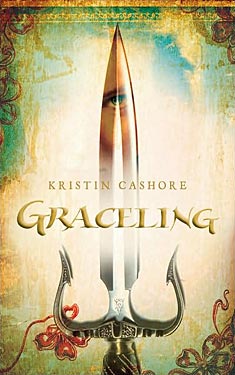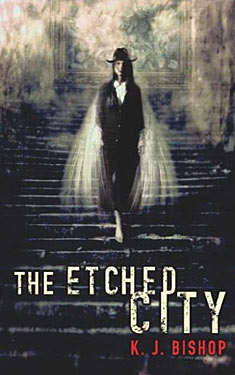WoGF Review: The Etched City by K. J. Bishop
 Stephanie (Rhetori_Cat), became a fan of science fiction and fantasy when she convinced her dad to hand over his copy of Ender’s Game by creepily reading over his shoulder until he couldn’t stand it anymore. Since then, she’s turned her love into a research interest as she works on her PhD in Rhetoric and Composition (don’t worry, nobody knows what that means). Her blog, Speculative Rhetoric, focuses on the relationships between speculative fiction and theories of gender, language, communication, and rhetoric.
Stephanie (Rhetori_Cat), became a fan of science fiction and fantasy when she convinced her dad to hand over his copy of Ender’s Game by creepily reading over his shoulder until he couldn’t stand it anymore. Since then, she’s turned her love into a research interest as she works on her PhD in Rhetoric and Composition (don’t worry, nobody knows what that means). Her blog, Speculative Rhetoric, focuses on the relationships between speculative fiction and theories of gender, language, communication, and rhetoric.
Magic and Metaporphosis
K. J. Bishop‘s first novel, The Etched City, appeared in 2003 and is her only novel to date. I had read a couple of her short stories, most notably “The Art of Dying” from the Vandermeer’s The New Weird anthology, so I was somewhat prepared for Bishop’s world of gunslingers and duelists, artists and prostitutes. At the same time, The Etched City is a novel that I can’t get out of my head and that I have trouble explaining to others when I try.
The Plot: After years of fighting a military dictator, former compatriots Raule and Gwynn leave the desert for the exotic city of Ashamoil. There Raule is shunned from the school of doctors despite her extensive knowledge of field medicine and instead takes a post in a religious hospital in one of the poorest districts of the city. Gwynn takes work as a hired gun for a slave trader, to Raule’s disgust. As Raule and Gwynn see each other more and more rarely, Gwynn begins an affair with a young artist named Beth, and at this point, the novel starts getting weird; Gwynn’s work situation becomes increasingly unstable as his girlfriend’s mental state appears to be deteriorating as well (at one point he goes to her house to find her with a bunch of strangers sewing together different parts of dead animals to create chimeric creatures). Beth eventually leaves the city, and shortly thereafter, Gwynn and Raule both decide to do the same, though separately.
WoGF Review: Where Late the Sweet Birds Sang by Kate Wilhelm
 Stephanie (Rhetori_Cat), became a fan of science fiction and fantasy when she convinced her dad to hand over his copy of Ender’s Game by creepily reading over his shoulder until he couldn’t stand it anymore. Since then, she’s turned her love into a research interest as she works on her PhD in Rhetoric and Composition (don’t worry, nobody knows what that means). Her blog, Speculative Rhetoric, focuses on the relationships between speculative fiction and theories of gender, language, communication, and rhetoric.
Stephanie (Rhetori_Cat), became a fan of science fiction and fantasy when she convinced her dad to hand over his copy of Ender’s Game by creepily reading over his shoulder until he couldn’t stand it anymore. Since then, she’s turned her love into a research interest as she works on her PhD in Rhetoric and Composition (don’t worry, nobody knows what that means). Her blog, Speculative Rhetoric, focuses on the relationships between speculative fiction and theories of gender, language, communication, and rhetoric.
 The blurb on the cover of my copy of Kate Wilhelm‘s 1976 novel Where Late the Sweet Birds Sang claims that it is the best novel about cloning ever. I was skeptical at first, but by the end of the novel I was pretty convinced that Wilhelm was doing something unique with the issue of cloning, engaging with the ethical issues from a different direction. At the same time, I’m still struggling with how to understand the final message of the text, whether Wilhelm wants us to celebrate the “individual” or understand that the “individual” is constructed out of a particular set of circumstances.
The blurb on the cover of my copy of Kate Wilhelm‘s 1976 novel Where Late the Sweet Birds Sang claims that it is the best novel about cloning ever. I was skeptical at first, but by the end of the novel I was pretty convinced that Wilhelm was doing something unique with the issue of cloning, engaging with the ethical issues from a different direction. At the same time, I’m still struggling with how to understand the final message of the text, whether Wilhelm wants us to celebrate the “individual” or understand that the “individual” is constructed out of a particular set of circumstances.
The Plot: David and his family begin reading the signs of the coming apocalypse with enough time to prepare an elaborate medical facility and living space for many people, including farmland and livestock. It quickly becomes apparent that the spreading plague and chemical fallout is making many of the inhabitants of the compound, both human and animal, sterile, and David and his fellow biologists design a plan for maintaining the human race via cloning. However, as the clones grow and develop, it becomes increasingly clear that they are incredibly alien from their human elders; rather than distinguishing themselves as individuals, clones understand the cloned siblings collectively to constitute a unit, and the mental development, including telepathy, reflects this. As the human elders die off, the clones set up a new society, but when the clones send off an exploratory party made up of individuals from different sibling sets, the traits of individuality begin to reappear, eventually resulting in the casting out of one woman and her further imprisonment upon becoming pregnant. Her son, Mark, is the protagonist on the last third of the novel, as the clones begin to exhibit signs of depletion in creative thinking and problem-solving skills and Mark begins his own plans to save the human race.
WoGF Review: Graceling by Kristen Cashore
 Stephanie (Rhetori_Cat), became a fan of science fiction and fantasy when she convinced her dad to hand over his copy of Ender’s Game by creepily reading over his shoulder until he couldn’t stand it anymore. Since then, she’s turned her love into a research interest as she works on her PhD in Rhetoric and Composition (don’t worry, nobody knows what that means). Her blog, Speculative Rhetoric, focuses on the relationships between speculative fiction and theories of gender, language, communication, and rhetoric.
Stephanie (Rhetori_Cat), became a fan of science fiction and fantasy when she convinced her dad to hand over his copy of Ender’s Game by creepily reading over his shoulder until he couldn’t stand it anymore. Since then, she’s turned her love into a research interest as she works on her PhD in Rhetoric and Composition (don’t worry, nobody knows what that means). Her blog, Speculative Rhetoric, focuses on the relationships between speculative fiction and theories of gender, language, communication, and rhetoric.
 Kristin Cashore‘s debut novel Graceling was published in 2008, about two and a half weeks after Suzanne Collins’ The Hunger Games. I make a point of saying this if only to remind myself that there is very, very little possibility that the novels are actually in conversation with each other, and instead they are perhaps reflecting larger cultural shifts. I read Graceling as part of the Worlds Without End Women of Genre Fiction Reading Challenge (henceforth the WoGF) since Cashore had been on my radar for a while, but I hadn’t actually read any of her work. I pretty much inhaled the novel; I read about half of it last night while I should have been reading for class, but no regrets.
Kristin Cashore‘s debut novel Graceling was published in 2008, about two and a half weeks after Suzanne Collins’ The Hunger Games. I make a point of saying this if only to remind myself that there is very, very little possibility that the novels are actually in conversation with each other, and instead they are perhaps reflecting larger cultural shifts. I read Graceling as part of the Worlds Without End Women of Genre Fiction Reading Challenge (henceforth the WoGF) since Cashore had been on my radar for a while, but I hadn’t actually read any of her work. I pretty much inhaled the novel; I read about half of it last night while I should have been reading for class, but no regrets.
The Plot: Katsa is the orphaned niece of King Randa and his number one thug. Possessing superhuman abilities, called her Grace, Katsa can kill pretty much anyone or anything with ease; unfortunately, she discovers her power by inadvertently killing an adult cousin when she was six years old because she did not want the man to touch her. Disgusted by her role as Randa’s enforcer throughout the seven kingdoms, Katsa organizes the Council, a group of individuals from lords down to servants who seek to protect citizens in all kingdoms from the power-hunger of their kings. Through her work for the Council, Katsa meets Po, a Graced fighting prince from the peaceful island of Lienid who searches for his kidnapped grandfather. After refusing to do Randa’s dirty work any longer, Katsa removes herself from the court and travels with Po as he seeks more information about his grandfather’s disappearance. What they discover is the underhanded work of the supposedly kind and beneficent King Leck of Monsea, who is himself Graced with the ability to fog people’s mind with his words and make them remember events as he chooses. Po and Katsa’s goal becomes saving Leck’s daughter Bitterblue from her sick, twisted, perverted, evil father.



















 Full Details
Full Details


